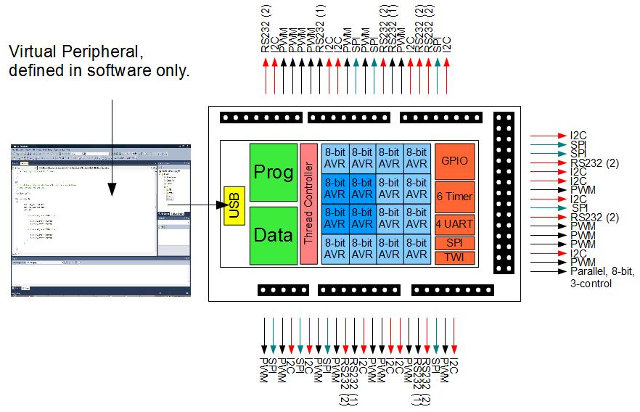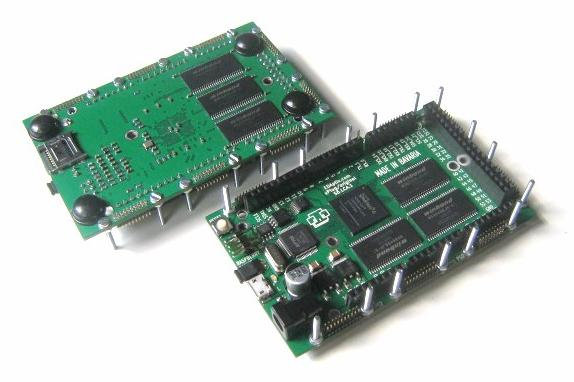Arduissimo a MultiCore Arduino project based on an FPGA Arduino Board powered by Xilinx Spartan LX6. It supports virtual peripherals, and allows you to configure PWMs, I2Cs, SPIs, and more on any of the 124 General Purpose IOs available through the board.
Arduissimo specifications:
- FPGA – Xilinx Spartan-6 LX16 CSG326 -2
- System Memory
- SDRAM Interface 1 – 1x 256MBit, 4x 64MBit, 166MHz
- SDRAM Interface 2 – 1x 64MBit, 166MHz
- Storage – EEprom for configuration file + micro SD card slot (4 pins connected to FPGA)
- USB – High Speed USB, FTDI HS2232HL (13 pins for “245 fifo sync” connected to the FPGA)
- 124 IOs:
- 4 IOs – 2.54mm header (e.g. Raspberry Pi)
- 72 IOs: Arduino Mega footprint (44 IOs shared with uPlug)
- 92 IOs: 8 uPlug connector slots (44 IOs shared with Arduino Mega)
- 50MHz oscillator
- Misc – Reset switch, 1x yellow LED, 4x bumpers
- Dimensions – 98.5 mm x 60 mm
- Power supply – DC 3.3V – 15V
The board is programmed via an enhanced Arduino IDE, called the Arduissimo IDE, using languages such as C++, and the binary is still uploaded via USB. The difference is that 16 processors are available, and more program and data memory. For some reasons, at least four cores must be utilized, and the system boots from the SD card.
 The FPGA allows you to create virtual peripherals such as PWMs, serial interfaces etc, using software code. There’s also CloudX8 emulator, written in Java, used to simulate the system, and test your program(s).
The FPGA allows you to create virtual peripherals such as PWMs, serial interfaces etc, using software code. There’s also CloudX8 emulator, written in Java, used to simulate the system, and test your program(s).
The developer has also created a Raspberry Pi bridge for the board to allow you to connect Arduissimo right on top of the Raspberry Pi, and improve I/Os flexibility of the ARM Linux board. Arduissimo and R-Pi can communication via SPI or USB. Further down the road, the board has been created with headers to create a “little monster” thanks to uPlug, a plug’n play system with various modules.

Apaprently it will also be possible to run SoC models from opencores.org such as MSP430, ARM, or OpenRisc1200, on the board. Finally, you’ll be able to connect the Arduissino board to an a standard Arduino and associated shields by soldering some connection pins and using some screws. So the board seems to be extremely versatile, and you may be able to find more details, and ask questions, on cloudx.cc. The source will eventually be available on arduissimo’s github repository,
Tobias, the developer, has just launched an Indiegogo campaign, where you can pledge for the FPGA board for 72 Euros, and adding the Raspberry Pi SPI bridge will cost a total of 76 Euros, both perks including shipping. Shipping is expected for November 2014.

Jean-Luc started CNX Software in 2010 as a part-time endeavor, before quitting his job as a software engineering manager, and starting to write daily news, and reviews full time later in 2011.
Support CNX Software! Donate via cryptocurrencies, become a Patron on Patreon, or purchase goods on Amazon or Aliexpress





